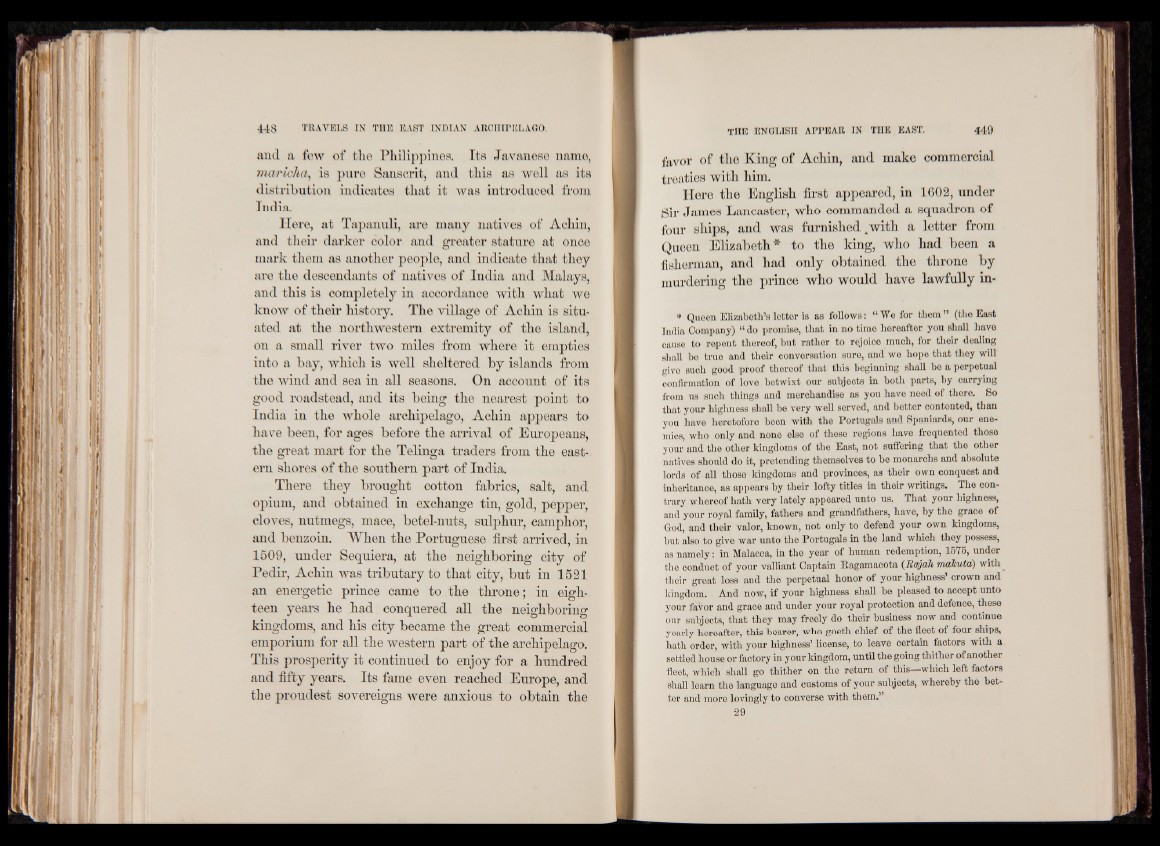
and a few of the Philippines. Its Javanese name,
maricha, is pure Sanscrit, and this as well as its
distribution indicates that it was introduced from
India.
Here, at Tapanuli, are many natives of Achin,
and their darker color and greater stature at once
mark them as another people, and indicate that they
are the descendants of natives of India and Malays,
and this is completely in accordance with what we
know of their history. The village of Achin is situated
at the northwestern extremity of the island,
on a small river two miles from where it empties
into a bay, which is well sheltered by islands from
the wind and sea in all seasons. On account of its
good roadstead, and its being the nearest point to
India in the whole archipelago, Achin appears to
have been, for ages before the arrival of Europeans,
the great mart for the Telinga traders from the eastern
shores of the southern part of India.
There they brought cotton fabrics, salt, and
opium, and obtained in exchange tin, gold, pepper,
cloves, nutmegs, mace, betel-nuts, sulphur, camphor,
and benzoin. When the Portuguese first arrived, in
1509, under Sequiera, at the neighboring city of
Pedir, Achin was tributary to that city, but in 1521
an energetic prince came to the throne; in eighteen
years he had conquered all the neighboring
kingdoms, and his city became the great commercial
emporium for all the western part of the archipelago.
This prosperity it continued to enjoy for a hundred
and fifty years. Its fame even reached Europe, and
the proudest sovereigns were anxious to obtain the
favor of the King of Achin, and make commercial
treaties with him.
Here the English first appeared, in 1602, under
Sir James Lancaster, who commanded a squadron of
four ships, and was furnished _with a letter from
Queen Elizabeth* to the king, who had been a
fisherman, and had only obtained the throne by
murdering the prince who would have lawfully in-
* Queen Elizabeth’s letter is as follows: “ We for them ” (the East
India Company) “ do promise, that in no time hereafter you shall have
cause to repent thereof, but rather to rejoice much, for their dealing
shall be true and their conversation sure, and we hope that they will
give such good proof thereof that this beginning shall be a perpetual
confirmation of love betwixt our subjects in both parts, by carrying
from us such things and merchandise as you have need of there. 8o
that your highness shall be very well served, and better contented, than
you have heretofore been with the Portugals and Spaniards, our enemies,
who only and none else of these regions have frequented those
your and the other kingdoms of the East, not suffering that the other
natives should do it, pretending themselves to be monarchs and absolute
lords of all those kingdoms and provinces, as their own conquest and
inheritance, as appears by their lofty titles in their writings. The contrary
whereof hath very lately appeared unto us. That your highness,
and your royal family, fathers and grandfathers, have, by the grace of
God, and their valor, known, not only to defend your own kingdoms,
but also to give war unto the Portugals in the land which they possess,
as namely: in Malacca, in the year of human redemption, 1575, under
the conduct of your valliant Captain Eagamacota {Rajah makuta) with
their great loss and the perpetual honor of your highness’ crown and
kingdom. And now, if your highness shall be pleased to accept unto
your favor and grace and under your royal protection and defence, these
our subjects, that they may freely do their business now and continue
yearly hereafter, this bearer, who goeth chief of the fleet of four ships,
hath order, with your highness’ license, to leave certain factors with a
settled house or factory in your kingdom, until the going thither of another
fleet, which shall go thither on the return of this—which left factors
shall learn the language and customs of your subjects, whereby the better
and more lovingly to converse with them.”
29